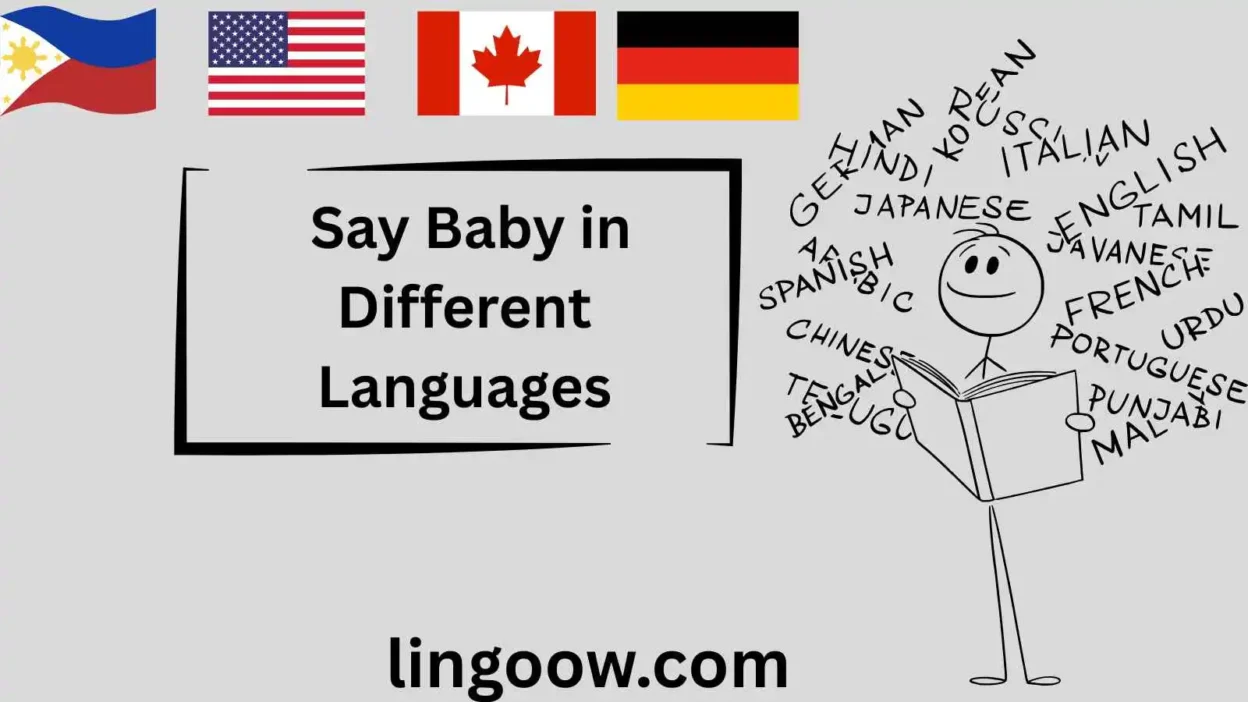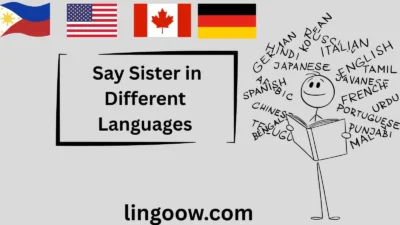When people search “How to Say Baby in Different Languages,” they’re usually curious, emotional, or preparing something special—like a message, social post, or even a baby name idea.
In this guide, I’ll walk you through how different cultures express the word baby, revealing cute, unique, and meaningful variations from around the world. Whether you’re exploring languages, creating content, or simply satisfying your curiosity, this list will help you understand and use these translations confidently.
So, let’s discover how people across countries show love for the tiniest members of their families.
A Quick-Reference Table
| Language | Word for “Baby” | Pronunciation (approx.) | Cultural/Linguistic Note |
| English | Baby | BAY-bee | Informal and affectionate; “infant” is more formal |
| French | Bébé | bay-BAY | Sounds almost identical to English; used with the same cooing tone |
| Spanish | Bebé | beh-BEH | Same spelling as French, but stress on the second syllable |
| Italian | Bimbo/a | BEEM-bo / BEEM-ba | “Bimbo” means little child (male/female); unrelated to the English slang! |
| German | Baby / Säugling | BAH-bee / ZOY-kling | “Baby” is commonly used; Säugling is the formal term for infant |
| Portuguese | Bebê | beh-BEH | Almost identical to Spanish |
| Dutch | Baby / Zuigeling | BAH-bee | “Baby” widely used in daily speech |
| Swedish | Bebis | BEH-bis | Directly borrowed from English |
| Russian | Малыш (malysh) | mah-LISH | Diminutive and very tender; also детка (detka) |
| Polish | Dziecko / Bobas | JECH-ko / BO-bas | Bobas is the cute, informal version |
| Greek | Μωρό (moró) | moh-ROH | Literally “foolish one” in ancient Greek — because babies don’t know anything yet! |
| Mandarin Chinese | 宝宝 (bǎobǎo) | baow-baow | Reduplicated for extra cuteness; literally “treasure treasure” |
| Cantonese | BB (bi-bi) | bee-bee | Literally just “B-B”; extremely common in texting and speech |
| Japanese | 赤ちゃん (akachan) | ah-kah-chan | “Red one” — because newborns are red! |
| Korean | 아기 (agi) | ah-gee | Often doubled as 아기야 (agiya) when cooing |
| Hindi | बच्चा (baccha) | BUCH-cha | Very common; शिशु (shishu) is more formal |
| Arabic | طفل (tifl) / بيبي (baby) | TIFL / BAY-bee | “Baby” borrowed in urban speech; طفلصغير (tifl saghir) = little child |
| Hebrew | תינוק (tinok) | tee-NOK | From the Bible; also בייבי (baby) in modern slang |
| Turkish | Bebek | beh-BEK | Same root as French/Spanish |
| Swahili | Mtoto | m-TOH-toh | Means both “child” and “baby”; mtoto mdogo = little baby |
| Zulu | Usana / Ingane | oo-SAH-nah | Usana specifically means newborn |
| Yoruba | Ọmọdé / Ọmọ-ọwọ | oh-moh-DAY | Ọmọ means child; ọmọ-ọwọ literally “child of the breast” |
| Amharic (Ethiopia) | Lij | LIDJ | Historically used for royal children too |
| Maori (New Zealand) | Pēpi | PEH-pee | Also means “pet” or “darling” |
| Hawaiian | Pēpē | PAY-pay | Almost identical to Maori |
| Samoan | Peapea | peh-ah-PEH-ah | Reduplicated form for affection |
| Cherokee | ᎠᏲᏟ (ayoli) | ah-YOH-lee | Literally “the little one” |
| Navajo | Łééchąąʼííshí | wuh-CHAHN-shih | Descriptive: “the one who is carried on the cradleboard” |
| Inuit (Inuktitut) | Angusiaq | ahn-GOO-see-ak | Means “little man” |
| Quechua (Andes) | Wawa | WAH-wah | Onomatopoeic — mimics a baby’s cry |
| Tagalog (Philippines) | Baby / Sanggol | BAY-bee / SANG-gol | “Baby” universally used; sanggol is more traditional |
| Thai | เด็ก (dek) / ลูก (luk) | DEK / LOOK | ลูก means both “child” and “fruit” — beautiful metaphor |
| Vietnamese | Em bé | ehm BEH | Literally “younger sibling” — all little ones are “little brothers/sisters” |
European Languages
In Europe, you’ll hear an astonishing number of words that sound suspiciously similar: bébé, bebé, bebê, baby, bebis… It’s not coincidence. The word “baby” itself probably comes from Middle English “baban” (an infant’s babbling), and spread across the continent through trade, colonization, and sheer cuteness overload.
French mothers famously sing “Fais dodo, Colas mon p’tit frère” (Go to sleep, Colas my little brother), treating even their own babies like cherished younger siblings. In Italy, calling a grown partner “bimbo” or “bimba” is peak romance — the same word you use for a toddler.
Asian Languages
Asia loves reduplication — repeating sounds to make something feel smaller and sweeter. Mandarin 宝宝 (bǎobǎo), Cantonese BB, Japanese 赤ちゃん (akachan with its soft “chan” honorific), Korean 아기야 (agiya) — they all roll off the tongue like lullabies. In Hindi-speaking homes, you’ll hear “gudda-guddi” for rag dolls that represent babies, showing how deeply the idea of “baby” is tied to play and protection.
African Languages
In many African cultures, a baby doesn’t just belong to the parents — the entire village claims them. In Swahili, harambee (“all pull together”) begins the moment a mtoto arrives. Zulu grandmothers might call a newborn usana while wrapping them in bright beads, believing the colors protect against evil spirits. Yoruba naming ceremonies on the 8th day are legendary — a child receives multiple names reflecting the circumstances of birth, family history, and spiritual hopes.
Indigenous & Island Cultures
For the Maori, every pēpi is tapu (sacred) from the moment they draw breath. The placenta is buried in ancestral land to literally root the child to their whenua (land). In Hawaiian tradition, a baby’s first laugh is celebrated with a party — because that’s when their soul fully enters their body. Navajo families still use cradleboards (the inspiration behind the long word for baby), believing the upright position lets the child see the world the way warriors once did.
Cultural Insights Through Time
The oldest known word for “baby” might be Sumerian “dumu” (child) from 3000 BCE. Ancient Egyptians used “khered” and depicted babies nursing under the protection of goddesses like Isis. In medieval Europe, infants were sometimes called “christom-chylde” because of the white cloth (chrisom) they wore if they died before baptism — a reminder of how fragile life once was.
Yet every civilization, no matter how warlike, created special tender words. Even Latin, the language of legions, softened to “pupus” or “infans” (literally “not speaking”) when talking about the littlest citizens.
Beautiful Proverbs About Babies From Around the World
- Arabic: “الطفل في المهد والله في قلبه” – The baby is in the cradle and God is in his heart.
- Japanese: “赤子の手をひねる” – Like twisting a baby’s arm (meaning ridiculously easy — because babies are powerless, not because anyone would!).
- Yoruba: “Ọmọ ló l’ọmọ” – It is the child that owns the child (a mother’s love is unmatched).
- Russian: “Не плачь, казак — атаманом будешь” – Don’t cry, little Cossack — you’ll be a chieftain one day.
- Hawaiian: “He pēpē ke kōkō a ke aloha” – Love is something born squishy and crying.
FAQs
Why do so many languages use something that sounds like “baby”?
It’s probably onomatopoeic — imitating the “ba-ba/ma-ma” sounds babies make worldwide when they first babble. Linguists call these “mama/papa words” the most universal in human language.
What’s the oldest recorded word for baby?
Sumerian tablets from 2900 BCE use “dumu” and “šārum” for child/infant.
Are there cultures that don’t have a special word for baby?
Almost none. Even the Pirahã cohort in the Amazon, famous for having very few words, distinguish young children with specific terms and treat them with intense affection.
Conclusion
No matter where you go — a bustling Tokyo train, a Maasai village in Tanzania, a rainy street in Dublin — whisper the local word for “baby” and watch faces soften. Strangers will smile. Grandmothers will reach out. Tough guys will suddenly speak in falsetto.
Because at our core, every human culture agrees on one thing: these tiny, helpless, drooling creatures are the most precious thing we will ever create.

Hi, I’m Elara Quinn, a professional author with a passion for language, culture, and communication. Through my work at Lingoow.com, I aim to make learning languages simple, fun, and meaningful for readers of all ages. With years of experience in writing and linguistics, I craft content that not only educates but also inspires curiosity and creativity in language learning. At Lingoow.com, I share tips, guides, and insights that help users connect with the beauty of languages around the world. Join me on this journey of words, stories, and discovery!




